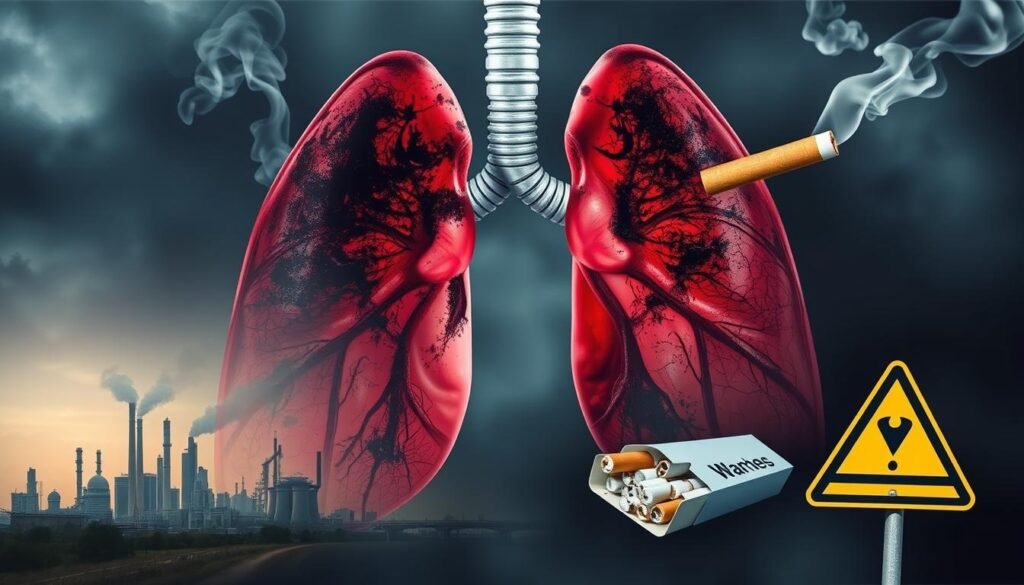In 2021, lung cancer claimed the lives of over 62,000 women in the U.S. This highlights the critical need to recognize lung cancer signs early. A chronic cough at night is a key symptom, often missed. About half of those with early-stage lung cancer cough before noticing other symptoms.
Nighttime coughing could point to lung cancer, among other causes. Knowing its link to lung cancer is important. It allows for quicker action, improving chances of successful treatment. Constant coughing especially at night, should not be ignored. It’s a clear signal to be on guard.
Key Takeaways
- Chronic cough at night can be a significant warning sign of lung cancer.
- About 50% of early-stage lung cancer patients report a cough as a symptom.
- Lung cancer cough may occur alongside other symptoms, emphasizing the need for awareness.
- Recognizing nighttime coughing can lead to timely medical intervention.
- Understand the difference between typical coughs and those that may indicate lung cancer.
Understanding Lung Cancer Cough
A cough from lung cancer isn’t like your regular cough. About 65% of people with lung cancer have a continuous cough. This number rises to 80% as the cancer advances. Such coughs last over eight weeks, so you should see a doctor.
At first, a cough from lung cancer may be dry. Later, it might produce phlegm. Along with a cough, you might feel tired and have trouble breathing. If you cough up blood, feel muscle pain, get headaches, or feel dizzy, these are serious signs. Don’t ignore a new cough, especially since lung cancer could be behind it, even if it’s rare.
Chronic coughs have many causes besides lung cancer. These include COPD, asthma, heart disease, acid reflux, allergies, infections, and things in the environment. Doctors take all these into account. They may use chest X-rays, CT scans, and MRIs to find out why you’re coughing so much.
There are ways to treat a cough from lung cancer. Some people get better with cough medicines and drugs that open up the airways. Home remedies like warm water with honey and ginger or using humidifiers also help. Paying attention to cough warning signs and getting help early is key.
| Characteristics | Lung Cancer Cough | Typical Cough |
|---|---|---|
| Duration | Persistent (more than 8 weeks) | Usually resolves within a few days to weeks |
| Nature | Chronic coughing, may be dry or wet | Often dry, occasional productive |
| Associated Symptoms | Difficulty breathing, fatigue, possible coughing up blood | Typically none, may include mild soreness |
| Frequency | Frequent throat clearing | Less frequent throat clearing |
What is a Lung Cancer Cough at Night?
A cough from lung cancer at night can really mess with your sleep. It makes it hard to get a good night’s rest. If you have lung cancer, this cough is a sign that the disease might be getting worse. Knowing about this cough is key to dealing with it better.
Characteristics of a Lung Cancer Cough
This cough doesn’t go away easily. It sticks around for more than a few weeks. This isn’t your normal cough.
- Frequent coughing, especially at night
- Possible presence of blood-tinged sputum
- Spasmodic coughing fits
If a cough lasts over eight weeks, it’s time to see a doctor. It often leads to feeling really tired and messing up your sleep.
Difference Between Wet and Dry Cough
It’s important to know the difference between a wet cough and a dry cough if we’re talking about lung cancer. A wet cough means there’s mucus, which might be because of a blockage. A dry cough could be from your lungs being irritated or side effects from treatment. With lung cancer, you could have either type.
| Cough Type | Characteristics |
|---|---|
| Wet Cough | Productive with mucus or sputum; may indicate infection or obstructions. |
| Dry Cough | Non-productive; often associated with irritation, inflammation, or treatment side effects. |
Both cough types can make you uncomfortable and interfere with activities. Knowing these symptoms helps, so you might need more checks or treatment.
Common Causes of Nighttime Coughing
Nighttime coughing can really mess up your sleep, making you tired and could cause more health issues. It’s important to know why this happens so you can find ways to stop it. The main reasons are health issues, including serious ones like lung cancer, and things in your environment that make it worse.
Lung Cancer and Other Health Conditions
Lung cancer is a big reason why people cough at night. A study in 2020 found that 54% of lung cancer patients who weren’t getting treatment coughed a lot. Coughing gets worse at night because of how you’re lying down. This is also true for other illnesses like COPD, asthma, GERD, heart failure, and infections. If you’re around things that bug your lungs, it gets even tougher to deal with.
Environmental Factors Contributing to Coughing
What’s around you can also make you cough more at night. A lot of people live in places with dirty air, which brings in bad stuff like toxins and allergens. Things like dust, smoke, and mold are especially bad when you’re inside. Knowing what makes it worse in your home can help you control it. Smoking is really bad because it’s linked to lots of lung cancer cases and chronic lung problems. This makes nighttime coughing more likely.
| Causes of Nighttime Coughing | Details |
|---|---|
| Lung Cancer | 54% of individuals without treatment experience a cough. |
| COPD and other lung diseases | Higher incidence among smokers; includes bronchitis and emphysema. |
| GERD | Can cause stomach acid to irritate the throat, triggering a cough. |
| Environmental Pollution | Polluted air exposure affects respiratory health. |
| Allergens | Pollen, dust and molds can worsen coughing during the night. |
Identifying Warning Signs of Lung Cancer
Spotting early warning signs of lung cancer can make a big difference in treatment. It’s important to watch out for certain signs that could signal trouble. One key symptom to be aware of is a persistent cough duration. A cough that starts mild and gets worse needs medical attention.
Persistent Cough Duration and Changes
Any cough lasting more than three weeks should be checked by a doctor. This is a major warning sign of lung cancer. If the cough changes, becoming more frequent or changing from dry to having mucus, it’s a concern. These changes can offer important hints to doctors.
Associated Symptoms to Watch For
Along with a chronic cough, there are other symptoms to watch for:
- Unexplained weight loss
- Loss of appetite
- Chest pain, especially when deep breathing
- Fatigue that does not improve with rest
- Shortness of breath
- Recurring respiratory infections, like pneumonia or bronchitis
- Wheezing
Being aware of these symptoms is very important. They could point to lung cancer or other conditions. Talking to your doctor early can lead to a faster diagnosis and better treatment plans. For more detailed information on warning signs of lung cancer, look at trusted medical sites.
| Symptom | Description |
|---|---|
| Persistent Cough | A cough lasting three weeks or longer, possibly changing in character. |
| Weight Loss | Unexplained loss of weight without changing diet or exercise. |
| Chest Pain | Pain that worsens with deep breaths; could indicate lung issues. |
| Shortness of Breath | Difficulty breathing or feeling breathless with minimal exertion. |
| Fatigue | Ongoing tiredness not relieved by rest. |
How Lung Cancer Affects Cough Patterns
Lung cancer changes coughing patterns, affecting over half of patients. Many start with a dry cough that can turn wet as the disease progresses. These changes often mean the disease is at an advanced stage or complicated by infections.
This condition makes people more tired and worsens their breathing difficulties. It impacts how well they can manage their daily activities.
Many people with lung cancer cough more at night. This affects their sleep and makes them feel more tired. Some notice a dry cough months before a doctor diagnoses them.
It’s important to spot these cough patterns early. Treatments can cause coughing too, making things harder for patients. Studies show getting help early for chronic, dry coughs leads to better outcomes.
Advanced lung disease leads to a worse cough in 65% of patients. This makes it harder for them to breathe.
Looking at ways to help manage coughs, research into brachytherapy and lasers has been done. Even with some treatments showing success, much of the research isn’t fully reliable yet. We still need good studies to find the best ways to help.
For more details, check out this comprehensive resource.
| Cough Type | Associated Symptoms | Typical Occurrence |
|---|---|---|
| Dry Cough | Fatigue, Nighttime Coughing Symptoms | Early Stage, Pre-Diagnosis |
| Wet Cough | Mucus Production, Possible Blood | Advanced Stage |
| Chronic Cough | Breathlessness, Sleep Disruption | Any Stage |
When to See a Doctor for a Cough
Knowing when to see a doctor for a cough is vital. A cough lasting more than three weeks needs attention. Especially if it comes with scary symptoms. It could be a sign of something serious, like lung cancer. It’s important to catch the warning signs early.
Key Symptoms Indicating a Lung Cancer Cough
There are a few symptoms of a lung cancer cough to watch out for:
- Persistent chest pain
- Shortness of breath
- Coughing up blood or pink-tinged mucus
- Unexplained weight loss
- Thick green or yellow phlegm
If you have these symptoms, see a doctor. It’s crucial for checking if it’s lung cancer.
Importance of Early Diagnosis
Catching lung cancer early makes treatment more effective. Ignoring a bad cough can miss the chance for early help. Acting fast on signs can improve health and control the disease better.

| Symptom | Importance of Attention |
|---|---|
| Persistent cough lasting over three weeks | May indicate serious medical condition |
| Coughing up blood | Requires immediate emergency care |
| Severe chest pain | Possible sign of lung cancer or other conditions |
| Significant weight loss | Could indicate advanced disease |
| Thick yellow/green phlegm | May require urgent treatment |
Diagnosis of Lung Cancer
Getting a lung cancer diagnosis involves several important steps. It starts with a detailed medical history and a physical check-up. After, doctors use imaging tests to look closer at the lungs. Key imaging tests include chest X-rays, CT scans, MRI, and PET scans. These tests are vital for spotting early signs of lung cancer.
When doctors see something unusual, they may ask for more diagnostic tests for lung cancer. During a bronchoscopy, doctors get tissue samples from the lungs to study in a lab. Also, analyzing sputum can show if there are cancer cells in the mucus.
Full imaging tests are very important, specially for those at high risk for lung cancer. For example, people over 50 who smoked a lot might get yearly screenings. Low-dose CT scans are used for this and they can catch cancer early.
Lung cancer is ranked from 1 to 4 stages. Higher numbers mean the cancer has spread more. Knowing the cancer’s stage helps decide on treatments like surgery or radiation. It also helps doctors choose the best medicine to fight the cancer.
It’s crucial to diagnose lung cancer early and accurately. This helps patients and doctors fight the cancer effectively. For tips on spotting early signs of lung cancer, click this link.
Treatment Options for Lung Cancer Cough
When dealing with a lung cancer cough, multiple strategies are necessary. These strategies help ease symptoms and attack the root cause. Enhancing the patient’s life and tackling health issues causing the cough are key goals.
Medications and Therapies
Treatments include medicines and other therapies. Various medications help those with a lung cancer cough, such as:
- Cough suppressants to make coughing less likely.
- Expectorants to clear mucus.
- Bronchodilators to open airways.
- Antibiotics for coughs caused by infections.
- Endobronchial therapies and brachytherapy for tumors blocking airways.
A lot of lung cancer patients think they need their cough treated, half to be exact. The cough affects their life, along with pain and losing their appetite. It’s important to manage it well.
Home Remedies and Natural Relief
Home remedies can also offer relief. For a natural approach, patients can try:
- Using humidifiers to moisten the air.
- Inhaling steam to loosen mucus.
- Drinking warm teas with honey for the throat.
- Doing deep breathing exercises for better lung health.
- Using postural drainage to clear mucus.
Choosing both medications and home remedies is key in cough management. This approach helps patients handle symptoms better and improves their health.

Coping Strategies for Nighttime Coughing
Dealing with nighttime coughing from lung cancer involves many strategies. These methods can make you more comfortable and sleep better. Raising your head with pillows helps decrease coughing. This easy change can make a big difference.
Adding a humidifier in your bedroom keeps the air moist. Aim for a humidity level between 40–50%. This moisture helps soothe your throat. Drinking plenty of water during the day is also key. It keeps your throat from getting dry.
Removing allergens from your home can help too. Clean often to cut down on dust and pet hair. Stay away from smoke and other things that can irritate your lungs. This can make your cough better.
Trying over-the-counter cough drops and antihistamines can help control coughing. Herbal remedies, like ivy leaf syrup, might also work well.
Using relaxation techniques can lower stress and improve your sleep. Deep breathing and gentle throat massage are good options. They can make your nights quieter and more restful.
Talking to a doctor is a good idea to find what works best for you. If coughing at night gets worse, seeing a doctor is important. Taking actions early on can improve your life and health.
| Strategy | Description | Benefits |
|---|---|---|
| Elevating Head | Prop up pillows while sleeping | Reduces coughing during the night |
| Using a Humidifier | Add moisture to the air | Alleviates dryness, soothing the throat |
| Reducing Allergens | Clean regularly to decrease dust and dander | Minimizes triggers for cough |
| Over-the-Counter Remedies | Cough drops and antihistamines | Provides instant relief |
| Relaxation Techniques | Practice deep breathing or throat massage | Promotes calm and restful sleep |
Understanding Risk Factors for Lung Cancer
It’s very important to know what increases your chance of getting lung cancer. Smoking is a big risk. If you smoke, you’re much more likely to get lung cancer compared to those who don’t. Most lung cancers are a type called non-small cell lung cancer. It makes up about 80 to 85 percent of all lung cancers. Knowing these facts can help you understand your risk and when to seek advice.
Things around you can also raise your lung cancer risk. Like being around secondhand smoke, radon gas, and asbestos. These things can seriously increase your chances of getting lung cancer. Carcinogens like arsenic and nickel add to these risks, too. If your job exposes you to these harmful things, your risk goes up. It’s important to make your workspace safer.
Having relatives who’ve had lung cancer also matters. It means you might have a higher risk of getting it too. Knowing about this can help you and your doctor look out for early signs. This way, getting diagnosed and treated early can make a big difference in your recovery.
The following table shows different lung cancer risk factors:
| Risk Factor | Impact Level | Description |
|---|---|---|
| Smoking | High | Includes regular smokers and those exposed to secondhand smoke. |
| Environmental Exposures | Moderate to High | Includes radon, asbestos, and carcinogens like arsenic and nickel. |
| Family History | Moderate | Genetic predisposition increases risk. |
| Occupational Hazards | Moderate | Working under conditions that expose individuals to carcinogens. |
Being aware of lung cancer risks can help you make smart choices about your health. Learning about environmental risk factors is a good step. Knowing early signs can lead to getting help sooner, which could lead to better chances of beating the disease.

Conclusion
A lung cancer cough often shows up mainly at night, pointing to possible serious health issues. It’s crucial for people to know the signs and get medical help early. Many patients believe their cough is severe enough to need treatment, showing how important it is to handle these symptoms quickly.
When it comes to lung cancer, it’s vital to notice the early warning signs and know how to deal with them. Research indicates that 67% of lung cancer patients may suffer from coughing, which can cause a lot of distress. This highlights the importance of self-care, like staying away from things that irritate the lungs and using relaxation methods. Keeping track of how you’re doing can also help improve your life’s quality.
Learning about a lung cancer cough and what it means allows people to take steps to get better. It’s important to get advice that fits you from health experts, as everyone’s experience with this illness is different. Getting help early can really make a difference, leading to better results for those affected.